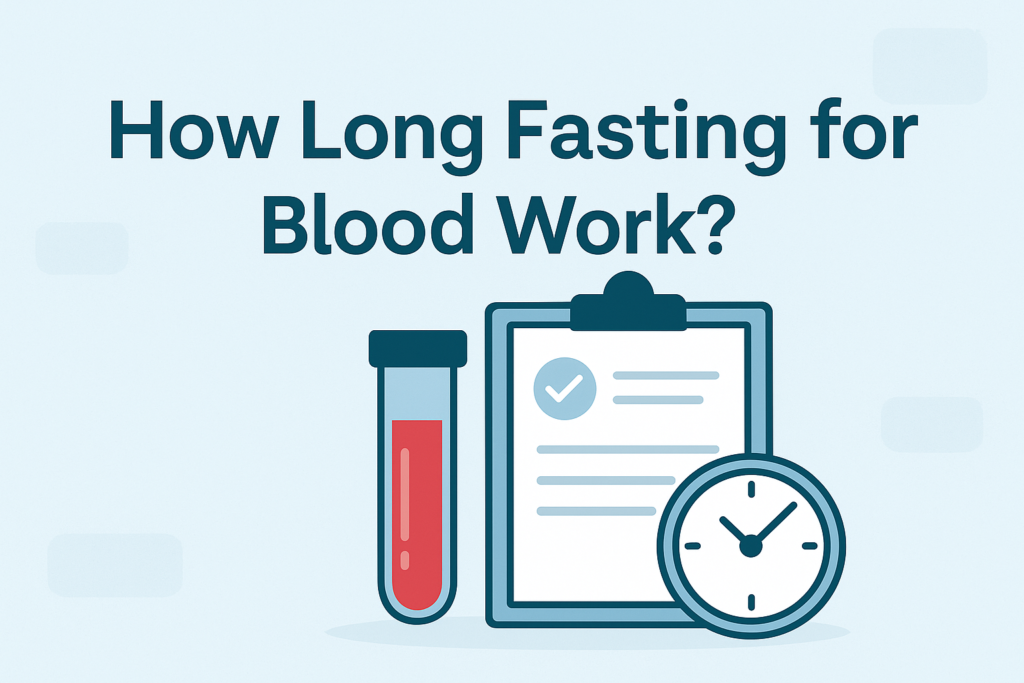When preparing for a blood test, one question comes up time and time again: how long fasting for blood work is needed to get accurate results? The answer varies depending on the type of test. But one thing is clear—your fasting window matters more than most people realize. This article will walk you through the science, recommendations, common myths, and preparation tips to help you approach your next test with confidence.
Why Fasting Matters Before Blood Work
Fasting means abstaining from food and most drinks (except water) for a specific period before your test. This helps your body return to a baseline state, giving doctors the clearest picture of what’s going on inside.
Eating before certain tests—especially those measuring glucose, cholesterol, or lipids—can skew results and potentially lead to incorrect diagnoses or unnecessary follow-up tests.
The Key Tests That Require Fasting:
- Lipid Panel – Measures cholesterol and triglycerides.
- Fasting Blood Glucose Test – Assesses blood sugar levels.
- Basic/Comprehensive Metabolic Panels (BMP/CMP) – Evaluates kidney, liver, and electrolyte function.
Recommended Fasting Durations by Test Type
Knowing exactly how long fasting for blood work is necessary depends on your specific test:
| Test Type | Ideal Fasting Duration |
|---|---|
| Lipid Panel | 9–12 hours |
| Fasting Blood Glucose | 8–10 hours |
| BMP / CMP | 8–12 hours |
Fasting longer than recommended won’t necessarily yield better results—it may cause dizziness, dehydration, or even hypoglycemia, especially if you have underlying conditions.
The Science Behind Fasting and Accurate Blood Work
When you eat, your body digests and absorbs nutrients, affecting your blood chemistry. For example:
- Carbs increase glucose levels.
- Fatty meals raise triglycerides and cholesterol.
- Beverages like coffee and alcohol alter hydration and electrolytes.
By fasting, you eliminate these variables. This allows your healthcare provider to evaluate your true baseline—unfiltered by your last meal.
Busting Common Myths About Fasting for Blood Tests
Myth 1: You can’t drink anything while fasting.
Truth: Water is encouraged. It helps keep veins plump and makes the blood draw easier.
Myth 2: Longer fasting equals better results.
Truth: Over-fasting can distort results and impact your well-being.
Myth 3: A heavy meal before fasting helps you “last longer.”
Truth: High-fat, high-sugar meals can linger in your system and skew results for hours.
Tips to Prepare for a Fasting Blood Test
- Schedule your appointment in the morning. This way, most of your fast happens while you sleep.
- Stay hydrated. Stick to water.
- Avoid caffeine and alcohol. Both can affect blood chemistry.
- Eat a balanced meal the night before. Avoid greasy, sugary food.
- Follow instructions. When in doubt, ask your provider exactly how long you need to fast.
What Happens During the Blood Draw?
- You’ll confirm your identity.
- A nurse or phlebotomist will locate a vein, usually in your arm.
- A small needle draws blood into one or more vials.
- It’s quick—most draws take less than 5 minutes.
Bring a snack to eat right after your test to replenish energy.
Are There Alternatives to Fasting?
Some modern lipid tests allow non-fasting measurements, but they’re not always suitable. If you have a medical condition like diabetes, your doctor may suggest alternatives or modified fasting periods to ensure safety.
Post-Test: What to Do After Your Blood Work
- Eat a healthy meal within 30 minutes of your draw.
- Drink water.
- Rest if you feel lightheaded.
- Avoid heavy exercise right away.
Conclusion: Mastering How Long Fasting for Blood Work Takes
Fasting properly before your blood test is one of the simplest things you can do to get accurate health data. Knowing how long fasting for blood work takes—and preparing accordingly—puts you in control of your health journey.
For more gut health insights, fasting tips, and wellness resources, explore our expert articles here at EmptyTheGut.com.

